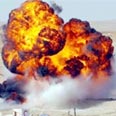
A document obtained by Ynetnews, jointly authored by three Iranian scientists, "seems to contain military applications for fuel-gas bombs," an expert on Iran said.
During a fuel-gas explosion, a cloud of fuel is set alight by a detonator to produce an explosion. The resulting wave flattens all objects close to the proximity of the epicenter, and produces widespread damage beyond the area of the cloud.
The document is a thesis which examines the "injection-velocity effects" resulting from fuel vapor clouds, and was authored by three Iranian scientists from the Imam Hossein University, the Sharif University of Technology, and the Iran University of Science and Technology.
"The large number of vapor-cloud explosions in the past, which involve severe damages, clearly indicates the need to consider this problem," the thesis's introduction said. "Preventing such events from happening requires a good knowledge of gas explosion and the way of reducing the frequency and consequence of its occurrence," it added.
Commenting on the thesis, Professor Raymond Tanter, who heads the Washington-based Iran Policy Committee (IPC), said: "Although seemingly innocent and only for scientific purposes, the document seems to contain military applications for fuel-gas bombs."
The IPC is made up of former members of the White House, State Department, Pentagon, and US intelligence agencies.
Tanter argued that such documents were allowed to be published up until recently in the Islamic Republic in order "to keep its young scientists at home rather than traveling to the West to publish."
"Too much attention is being paid by the press to one aspect of Iranian activities within the nuclear cycle-uranium enrichment," Tanter said, adding that, "based on reports of the National Council of Resistance of Iran—the main Iranian opposition group—the regime has made great progress" in other forms of nuclear enrichment, such as "centrifuge separation and laser enrichment."
Regime approaching nuclear-weapons status
"There is a humongous need for American and Israeli researchers to compile inventories of the Iranian regime's progress reported in the open English and Farsi literature," Tanter said.
"As the regime approaches nuclear-weapons status, it is likely to plug leaks to the Iranian opposition and put a lid on reporting by its young scientists, who were permitted to publish in the open literature perhaps to keep them from emigrating to countries that would permit such publishing," he added.
Tanter said it was crucial "to collect resumes and other information on Iranian professors and research engineers to follow their nuclear research activities."
Meanwhile, Iranian Foreign Ministry Spokesman Mohammed Ali Hosseini said his country would be unaffected by the latest UN resolution tightening sanctions against Tehran.
The Islamic Republic of Iran Broadcasting website quoted Hosseini as saying that "Iran's nuclear program is peaceful," and as expressing "Iran's readiness for removing any ambiguities concerning the nuclear dossier as well as holding unconditional talks with a clear timetable."















